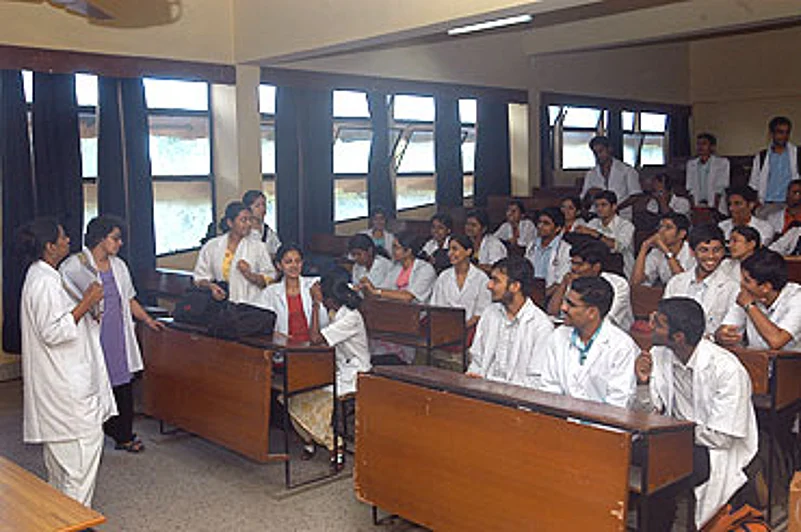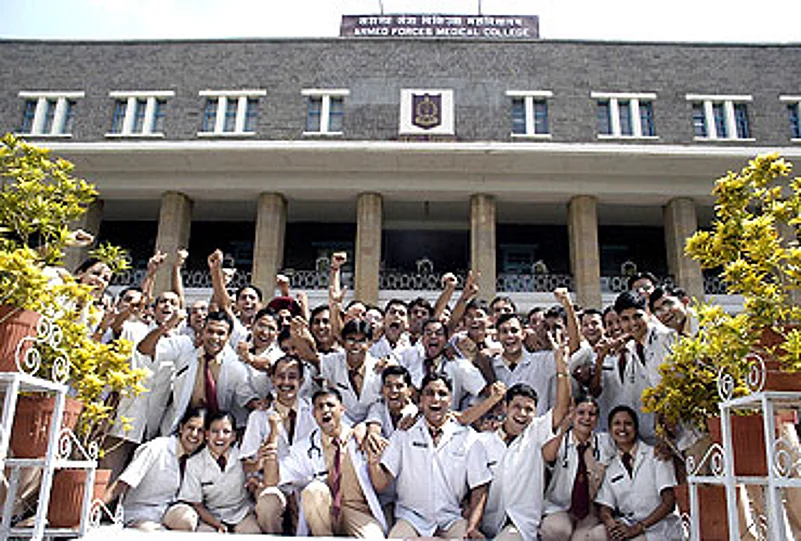- Chennai About 100 engineering colleges within the city and its periphery, largest concentration in the country
- Hyderabad Has 70 engineering colleges in and around the city out of the state's 340, as well as 6 medical colleges
- Bangalore Widest variety of colleges-25 engineering, 14 law, 11 medical and 17 dental, 18 for pharmacy, 7 for nursing etc
- Pune Has over 60 engineering colleges out of state's 1,350; 20 medical colleges, including for homoeopathy, nursing
- Kochi It has 10 engineering colleges out of the state's 84, nine medical and dental colleges, and 12 nursing colleges
***
- New colleges springing up each year means shortage of senior faculty and poaching from existing colleges
- Many new colleges lack proper infrastructure, facilities
- A large number of professional colleges in these areas owned by influential politicians and businessmen
- Most colleges charge capitation fees-between Rs 2.5 lakh and 20 lakh-for engineering and medicine
- Placement from these colleges saw a dip last year with number of companies visiting campuses down
***

Now criss-cross to Bangalore, India's traditional IT hub with an environment of technical education few can match. In numbers, that's 25 engineering colleges, 14 law colleges, 11 medical colleges, 17 dental colleges, 18 colleges of pharmacy, 7 colleges for nursing...you get the picture. One last stop in the south, Hyderabad, which boasts of 70 engineering colleges catering to over 1,20,000 students from the city and neighbouring districts.
As any professional college aspirant will tell you, these places are India's new centres of technical education where the country's future is nurtured, incubated and polished to face the world. What drives students to these hubs? Are they growing or stagnating? And at these 'centres' of educational excellence, aren't a good number of institutions substandard too? Finally, what issues—and challenges—are these hubs facing?
One of the main reasons for the concentration of educational institutions in these cities is the strong local presence of big industry. Bangalore has the who's who of global infotech; Chennai has recently become a hub of industrial activity with as many software companies within its periphery as manufacturing units. Hyderabad and Pune have also grown to become seats of industry—the former also has a good share of IT companies in its Hi-Tech City. And thanks to its proximity to Mumbai, Pune has a number of manufacturing units in its industrial belt apart from the new Hinjewadi IT estate.
Predictably, in most southern states, there's a strong preference for technical courses, most families wanting to put their children in either engineering or medicine at any cost. As Dr P. Narasimha Reddy, principal, Sreenidhi Institute of Science and Technology, Hyderabad, puts it, "People in Andhra Pradesh have a lot of faith in technical education. Today, looking at the prosperity it brings, many farmers are even selling their land to fund their children's foray into technical education."
With peer pressure to get into an engineering college mounting, the demand for seats has also been on the rise in southern and western states. In Chennai alone, there has been a 60 per cent jump in the number of applicants to engineering courses this year with over 1.4 lakh students applying. At Chennai's Anna University, the nodal agency for engineering admissions in the state, one lakh students are expected to be enrolled for BE and BTech courses this year against 84,000 applications received last year.
With around 100 engineering colleges, Chennai is undoubtedly India's biggest hub for technical and engineering studies. The southern metro's honeymoon with engineering colleges began in the 1990s. But for a blip during the dotcom bust, it has remained one of India's favourite spots for technical education. With wealthy politicians and businessmen owning a majority of these engineering colleges, the ripple effect has spread across the state of Tamil Nadu (271 engineering colleges and counting). And with demand showing no signs of petering out, there are 120 applications—one-fourth of which come from top institutes—to set up new colleges in the state. For those who cannot find a seat in the bigger colleges, there are also several smaller institutions that offer employment-oriented technical courses.
Clearly, the success of a city-specific hub feeds the growth of colleges in the state around it. Thanks to the boom in Hyderabad, the number of technical colleges in Andhra Pradesh has surged in recent years. The state today has 340 engineering colleges with the Telangana region alone having 150. Similarly, towns and cities in Bangalore's vicinity like Mysore, Mandya, Kolar and Tumkur also have many quality professional colleges. Bangalore is, in many ways, the epicentre of education in the South Karnataka or Old Mysore region. A bit further, there's a nondescript village filled with laterite rocks called Manipal, near the temple town of Udupi in Karnataka, which has been transformed into a 'knowledge town', catering to about 20,000 students including some 3,000 international ones.

St John’s Medical College, Bangalore, is an old favourite
Even distant Kochi in Kerala has 10 engineering colleges. While colleges elsewhere have mostly stuck to conventional streams, Kochi's colleges have introduced new streams like naval architecture, biomedical and marine engineering. Cochin University of Science and Technology (Cusat) has courses even in microprocessor research, aquatic animal health and monsoon studies. Despite the state's pro-public sector tilt, Kochi's resilience is evident in the dozen-odd nursing colleges too, most of which have been set up by the private sector. There are also nine medical colleges.
But the biggest concentration of engineering colleges by far is in Maharashtra, which currently has over 1,300 engineering colleges approved by the All India Council for Technical Education (AICTE). There are also many that are not accredited and academicians in the state say new ones are springing up every day. Dr Rakesh Jain, principal, DY Patil Institute of Engineering and Technology, Pune, avers that not a single seat went vacant in Maharashtra in the last admission session.
Unfortunately, all these colleges and institutes cannot boast of proper facilities for technical studies, forget a proper teaching faculty. As Mangesh Karad, executive director, Maharashtra Institute of Technology, Pune, puts it: "There are groups that open 2-3 colleges every year. You can't develop good facilities or get good teachers at that rate. It has become a business as everyone, from builders to businessmen, is opening up colleges. " But most students, who pay significant sums to get into these colleges, are unaware of these deficiencies. Once the money is paid, most of them get stuck in the system. Of late, many new and existing institutions have also been going in for deemed university status, which gives them autonomy of functioning. This, many academicians fear, will lead to a drop in education standards as institutions with the freedom to design their syllabus and admission system may write their own rules on how they impart education.
The proliferation of colleges has also led to a significant shortage of senior faculty in most of these hubs—which has in turn resulted in large-scale poaching of senior faculty from existing colleges. Complains Lt General Mahesh Vij, director, Army Institute of Technology (AIC), Pune: "There's a severe shortage of senior faculty across Pune. We pay according to ugc standards but others are throwing money to get teachers." Also, the lack of students going in for higher studies in engineering is also creating a shortage of new teachers. Says G. Selva, Tamil Nadu state secretary, Students Federation of India: "Often you see a student who has just passed out coming back to teach juniors while he waits for a job in software."
Of course, despite the availability of such large numbers, it is not cheap to get into these colleges. While government colleges still charge moderate to low fees, private-owned colleges do extract their pound of flesh. So it's no surprise that the best students still prefer government colleges. The silver lining, though, is that most of the students coming out of private colleges find employment, thanks to the increasing demand industry is creating for technical manpower. So despite the campus recruitments from iits and other top engineering colleges, a majority of the workforce comes from these private colleges.

AFMC, Pune, still one of the country’s premier medical colleges
But has the global economic slowdown—and a dip in manufacturing growth in India—had an impact on these colleges? Well, according to Mohammed Tajudeen, placement officer at Crescent Engineering College, Chennai, there was a 25-30 per cent decrease in the number of companies visiting the campus. Says Arun Ramaswamy, Velammal Engineering College, Chennai: "Smaller companies are even taking back slots they had given to colleges." However, the picture in other cities, like Pune and Bangalore, still seems upbeat with colleges claiming over 90 per cent placement of their students.
With India fast becoming a manufacturing hub of global companies thanks to tphe low-cost advantage, the demand for technical manpower is expected to grow significantly in the coming years. For all the problems and issues, these cities and their educational infrastructure give us some hope that India is prepared to face it.






















